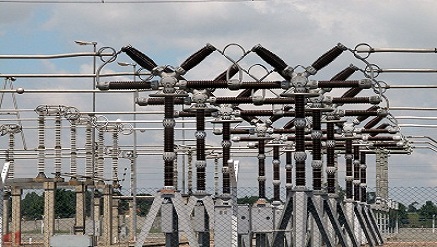General News
FG Promises Stable Power Supply from October

Federal government Friday promised that power supply will be stable in the country by October this year.
Prof. Chinedu Nebo, minister of Power disclosed this to State House correspondents at the end of a meeting on power chaired by Vice President Namadi Sambo at the State House, Abuja.
Maintaining that other issues in the electricity value chain are being addressed in the country, he said that power supply has improved in the country in the past one week due to improved gas supply.
He also said the Federal Government is making arrangements to ensure that the bills of electricity generating companies are promptly paid.
He said: “The cheering news from all of these is that if you have noticed throughout the country in the past one week people have been getting better power supply.
“The gas is now beginning to come back and it’s something that gives all of us a lot of joy. And we know that it will continue to grow that way even until December because of some of the facilities, maintenance and repair works on the gas equipment and so on.”
“The gas producers have come to a place where almost all of these are being taken care of and then the new gas we are expecting, we have them trickling in right now.
“So that’s part of the shortfalls we’ve had in production up to this time, we hope that by the beginning of October, we will see a much better stabilisation of the entire power delivery system in the country.”
He went on: “First, I would say we rejoice that for the first time in a long time we have been averaging over 4,500MW when we include nearly 300MW of spilling reserve which is put there to ensure the reliability and stability of the grid at all time.”
“So, we are really moving forward; it may not be as rapid as Nigerians expect, but it is important to let everybody know that indeed we are advancing, we are making progress and we will continue to make progress.”
General News
Nigeria to Launch $40 Million Fund for Tech Startups

Nigeria has plans to launch a $40 million fund to support early-stage tech startups, aiming to strengthen the country’s entrepreneurial ecosystem and reduce young companies’ reliance on private investors.

The fund will be equally financed by the Japan International Cooperation Agency (JICA) and the Nigeria Sovereign Investment Authority (NSIA), which manages the national sovereign wealth fund.
Kashifu Inuwa Abdullahi, director general, National Information Technology Development Agency (NITDA), confirmed the final agreement would be signed within the next month.
The initiative is part of Nigeria’s Startup Act, adopted in October 2022, which aims to create a favorable environment for startups through tax incentives and financial support.
The act established a 10 billion naira (approximately $8.6 million) annual fund to finance certified startups through seed funding, grants, or loans.
According to Disrupt Africa, Nigeria’s startup ecosystem attracted over $2 billion in investments between January 2015 and August 2022, positioning the country as Africa’s leader.
Companies like Flutterwave, Andela, and Opay achieved multi-billion-dollar valuations.
, fundraising dropped to $224 million in 2023, down from $531 million in 2022 and over $1 billion in 2021.
This decline highlights the need for government intervention to revitalize the tech ecosystem amid investor caution.
The new fund marks a significant step for Nigeria, which aims to foster local innovation.
Currently, 12,948 companies are registered as startups, benefiting from a three-year tax exemption. Low awareness of the law’s benefits has prompted the government to plan a nationwide information campaign.
By facilitating access to funding, the initiative could strengthen support for existing startups and stimulate new tech ventures, reinforcing Nigeria’s position as a leading hub for digital innovation in Africa.
General News
Nigeria, Kenya among Nations Running out of HIV Drugs – WHO

Eight countries – six of them in Africa, including Nigeria, Kenya and Lesotho – could soon run out of HIV drugs following the US government’s recent decision to pause foreign aid, the World Health Organization (WHO) has said.

US President Donald Trump announced the freeze on his first day in office in January as part of a review into government spending.
“Disruptions to HIV programmes could undo 20 years of progress,” Tedros Adhanom Ghebreyesus, WHO chief warned.
It could also lead to more than 10 million additional cases of HIV and three million HIV-related deaths, he added, noting this was “more than triple the number of deaths last year”.
Nigeria, Kenya, Lesotho, South Sudan, Burkina Faso and Mali – as well as Haiti and Ukraine – would run out of live-saving anti-retroviral (ARV) medicines in the coming months, Dr Tedros said at a press conference on Monday.
Trump’s executive order paused foreign aid support for an initial duration of 90 days in line with his “America First” foreign policy.
It has affected health programmes around the world, leaving shipments of critical medical supplies, including HIV drugs, greatly hampered.
The majority of the US Agency for International Development’s (USAID) programmes have since been terminated.
Despite a waiver issued in February for the US’s ground-breaking HIV programme, its work has severely impacted.
Known as the US President’s Emergency Plan for Aids Relief (Pepfar), it relies on logistical support from USAID and other organisations hit by the turmoil.
It has led to the “immediate stop to services for HIV treatment, testing and prevention in more than 50 countries”, Dr Tedros said.
Launched in 2003, Pepfar has enabled some of the world’s poorest people to access anti and has been credited with saving more than 26 million lives worldwide.
During his first days in office, Trump also announced that the US would pull out of the WHO, affecting funding for the global health agency.
“The US administration has been extremely generous over many years. And of course, it’s within its rights to decide what it supports and to what extent,” Dr Tedros said.
“But the US also has a responsibility to ensure that if it withdraws direct funding for countries, it’s done in an orderly and humane way that allows them to find alternative sources of funding.
An estimated 25 million people are living with HIV in sub-Saharan Africa, which is more than two-thirds of the global total 38 million people living with the disease.
In Nigeria, nearly two million people are living with HIV, with many relying on receiving aid-funded medicines.
Kenya has the seventh-largest number of people living with HIV in the world, at around 1.4 million, according to WHO data.
“We ask the US to reconsider its support for global health, which not only saves lives around the world, it also makes the US safer by preventing outbreaks from spreading internationally,” Dr Tedros said.
General News
NIN Enrolment Hits 117.3m – NIMC

National Identity Management Commission (NIMC) has announced that as of February 28, 2025, the number of Nigerians enrolled in the National Identification Number (NIN) database has reached 117.3 million.

This marks a significant increase of over seven million registrations since September 2024, when the figure stood at 110 million.
Gender and State Distribution
The latest statistics reveal that 56.5% of registered individuals are male, totaling 66.2 million, while 43.5% are female, at 51.07 million.
Among states, Lagos leads with 12.6 million registrations, followed by Kano with 10.2 million and Kaduna with 6.9 million.
This is consistent with the high populations in Lagos and Kano.
Other states with notable enrolment numbers include:
Ogun (4.9 million),
Oyo (4.5 million),
Katsina (4 million).
In contrast,
Bayelsa (758,111),
Ebonyi (990,775),
have the lowest enrolment figures.
The government has been emphasising the need for citizens to link their NIN to access essential services, including social services, financial transactions, and telecommunications.
A well-developed and accessible digital ID system is seen as vital for effective digital governance.
Beyond strengthening security and promoting transparency, this initiative aims to enhance the efficiency of service delivery across the country.

 Broadcasting3 days ago
Broadcasting3 days agoPublic Outrage, Legal Threats as Abuja Council Demands N500, 000 as TV Levy

 E-Financial3 days ago
E-Financial3 days agoFIRS Partners Flutterwave for Digital Payment Collection

 General News2 days ago
General News2 days agoNigeria, Kenya among Nations Running out of HIV Drugs – WHO

 News2 days ago
News2 days agoNAFDAC Destroys over N1 Trillion Fake Drugs in Anambra

 Telecom3 days ago
Telecom3 days agoNigeria Charts New Course to Bridge Gender Digital Divide at UN’s CSW69

 Telecom2 days ago
Telecom2 days agoTikTok and Truecaller Face NDPC Investigation Amid Data Protection Concerns

 General News3 days ago
General News3 days agoNIN Enrolment Hits 117.3m – NIMC

 Telecom2 days ago
Telecom2 days ago9mobile Denies Shutdown Rumours, Promises Improved Services

























